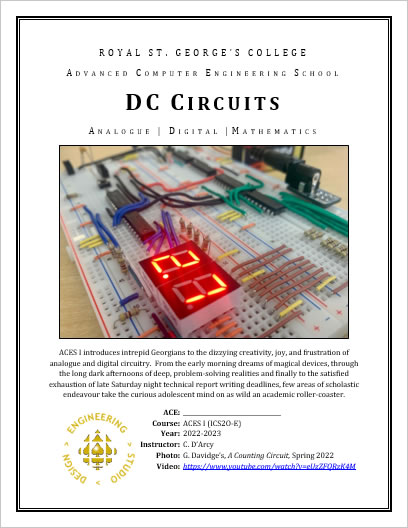COURSE |
|
ICD2O |
 |
| NAME |
|
Digital Technology and Innovations in the Changing World |
TYPE |
|
Open |
DATE |
|
2023 09 06 |
DESCRIPTION |
|
This course helps students develop cutting-edge digital technology and computer programming skills that will support them in contributing to and leading the global economic, scientific and societal innovations of tomorrow. Students will learn and apply coding concepts and skills to build hands-on projects and investigate artificial intelligence, cybersecurity, and other emerging digital technologies that connect to a wide range of fields and careers. Using critical thinking skills with a focus on digital citizenship, students will investigate the appropriate use and development of the digital technologies that they encounter every day, as well as the benefits and limitations of these technologies. |
DOCUMENTS |
|
Computer Studies
Growing Success: Assessment, Evaluation and Reporting in Ontario Schools,
2010 |
INSTRUCTOR |
|
C. D'Arcy |
CREDIT |
|
1.0 |
HOURS |
|
110 |
PREREQUISITE |
|
none |
MATURITY |
|
0 (0-New course; 5-Established) |
|
OVERVIEW |
|
This full-year, hands-on course builds on the Science 9 Unit, Introduction to Electricity. Students work their way through concepts surrounding analog and digital circuitry employing curriculum designed specifically for our RSGC ACES program. An introduction to and the coding of the Arduino microcontroller is introduced. Topics include power supply, design, and prototyping of analog circuits, logic, semiconductors, integrated circuits, communication as well as safety, environmental, and societal awareness. Topics may also include discussions related to AI and cybersecurity. This course provides the foundation for our subsequent ICS3U-E Building Blocks course. |
 |
| RESOURCES |
|
Ontario Ministry of Education and Training: ICD2O Course Description
DC Circuits. 6th Ed, C. D'Arcy. Design Engineering Series. 2022.
Toolkit
ACES' Web Site
|
 |
| STRATEGIES |
|
Units are project based. Teacher demonstrations and hands-on
circuit research and assembly provide the students with the necessary
terminology and methodology to meet the expectations. Classroom discussions,
collaborative and co-operative learning, research, report writing
and taking notes will assist students in achieving success.
Upon completion of this course, students will demonstrate the ability to
apply skills and knowledge to practical situations that
involve the completion of work assignments and problem-solving
activities. |
 |
| EVALUATION |
|
Design Engineering Report: 70% (Formal Reports of Common In-Class Projects)
Indepedent Study Project (ISP)
: 30% (Third Term)
"Within the course, students are provided with a substantial level of agency and choice in terms of the contexts, intended users, and purposes of the programming projects they undertake."
Categories of Assessment:
Knowledge & Understanding/Thinking, Problem-Solving/Communication/Application |
|
| STRANDS |
|
Fundamentals: basic components, digital logic, integrated circuits, Microcontroller Unit (MCU) programming (C) |
|
| |
|
Skills: measuring and analyzing circuit properties with a digital multimeter, reading datasheets and schematics, breadboard prototyping, circuit board assembly and soldering, circuit encasement design and implementation, coding, advanced Word techniques, technical writing, video presentation techniques, etc. |
|
| |
|
Technology and Society: environmental and health issues |
|
| |
|
Professional Practice and Ethics: Canadian Council of Professional Engineers
Code of Ethics |
|



